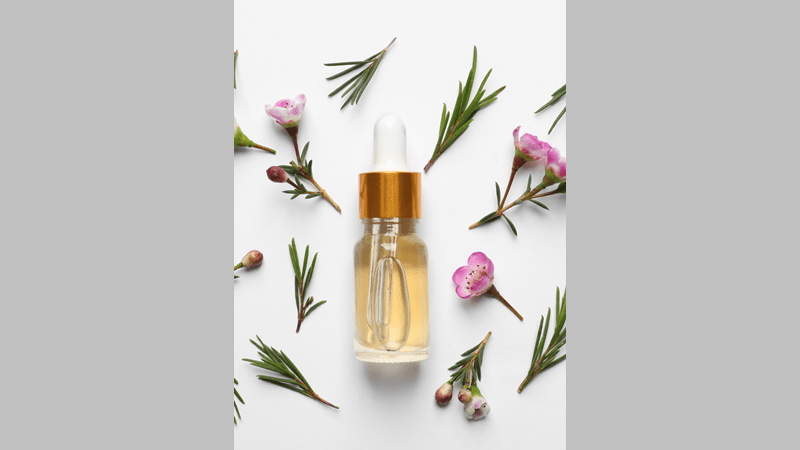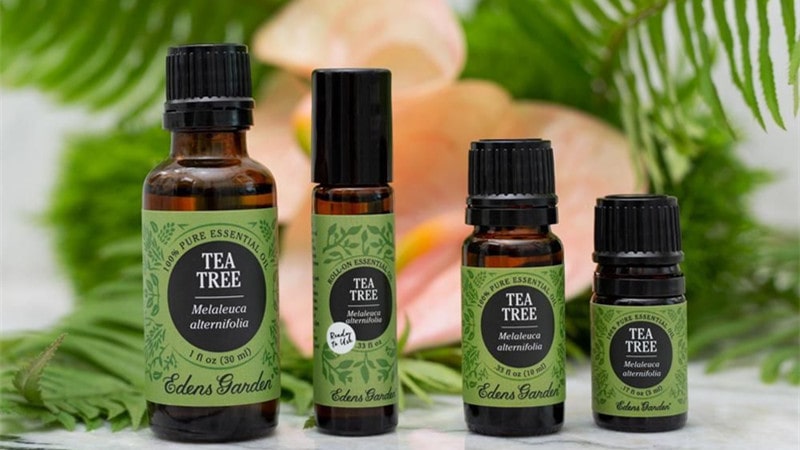In wellness circles, tea tree oil is a popular miracle worker that can help make your skin look shiny and soft to the touch. But this essential oil has many other uses that are not as widely known.
From combating mold to keeping your hair and nails healthy, here are all the benefits of tea tree oil that you should be aware of. Read on!
What Is Tea Tree Oil?

Image source: Pinterest
Tea tree oil comes from a plant known as Melaleuca alternifolia. Native to Queensland and New South Wales, Australia, this little tea tree plant should not be confused with the species used to make green and black tea (Camellia sinensis).
For centuries, Aboriginal people of Australia have used tea tree leaves to make oil. The oil was considered a powerful medicine that they used to treat coughs, sore throats, and heal superficial wounds on the skin.
Nowadays, tea tree oil is still a popular natural remedy, although its uses have altered a little throughout the years. Today, it is most commonly used to treat and prevent bacterial and fungal skin infections, as well as to boost one’s overall health.
Here are the most important uses and benefits of tea tree oil that you should know about.
7 Benefits of Tea Tree Oil

Image source: Pinterest
1. A Natural Hand Sanitizer
Studies show that tea tree oil can kill many common bacteria and viruses responsible for various illnesses. In fact, adding it to hand sanitizers can significantly boost their cleansing effectiveness.
And the best thing is, you can make your own mixture! Simply add approximately ten drops of tea tree oil to a 2-ounce bottle of organic cane alcohol, and your sanitizer will be ready!
2. Acne Treatment
Research suggests that this essential oil can reduce fungi-related acne issues. It can neutralize these fungi, keeping the skin smooth and clear. This oil has proven to be just as effective in treating acne as the most commonly used substance in medications: benzoyl peroxide.
There are two ways to use tea tree oil to treat acne. For one, you can buy a tea tree-based gel at pharmacies or natural grocery stores. Alternatively, you can make your own concoction: mix some of the oil with water and apply it to the skin. However, before applying, test the mixture on your skin to ensure it doesn’t irritate the affected area.
3. A Natural Mouthwash
Tooth decay and bad breath are usually caused by an excess amount of bacteria in the mouth. According to recent studies, tea tree oil can kill these bacteria, making it an effective natural mouthwash.
Its pleasant flavor is another thing that makes this oil a good choice. Namely, it is not as harsh as chlorhexidine, a common substance used in oral rinse liquids. If you want to use tea tree oil as a mouthwash, simply dilute one drop into a glass of warm water, mix well, and swish the mixture in your mouth for around 30 seconds.
4. Soothing Irritated Skin
When your skin comes into contact with allergens, it usually becomes red, itchy, and highly sensitive. In such circumstances, it is best to use a gel or cream to soothe the skin and cool it down.
Studies point out that tea tree oil might alleviate these symptoms by at least 40%, which is a significant number. To use the oil to treat irritated skin, you should mix ten drops with one tablespoon melted coconut oil and one tablespoon extra virgin olive oil. Just apply the mixture to the affected area, and the symptoms should disappear in a few days.
5. Treatment for Mold
If you buy fresh fruits and vegetables regularly, you probably know how susceptible they are to mold growth. Luckily, there is a natural remedy that can help you keep your food safe and make it last longer.
Your task is simple. Add ten drops of tea tree oil to some water and wash your produce thoroughly in the mixture. Dry everything once you are done, and your fruits and vegetables will be ready for storing!
6. Remedy for Nail Fungus
Although fungal infections on the nails aren’t too dangerous, they are rather unsightly. Fortunately, there are many natural remedies you can use to treat them, and tea tree oil is one of them. Studies show that at least 60% of users didn’t have an infection anymore after tea tree oil treatments for six months .
In this case, it is a good idea to apply a few drops of the oil directly to the infected area without diluting it. Just make sure to wash your hands immediately after touching the surface so as not to spread the infection further.
7. Hair Growth Agent
Finally, tea tree oil can also promote hair growth. It can do so by increasing the blood flow near your hair follicles. All you have to do is apply the oil to your scalp, either on its own or mixed with another carrier oil. Aside from helping your hair grow, it will also help with dandruff and keep your skin moist and smooth.
Can You Apply Tea Tree Oil Directly to the Skin?

Image source: Pinterest
Yes, you can safely apply tea tree oil directly to your skin, whether it’s your hands, face, legs, or head. However, wash the area immediately if you start feeling any burning or itching as soon as you apply the oil. It can irritate sensitive skin, so always be cautious while using it.
To be safe, it might be best to pour two drops on your skin and wait for around 24 hours. If there is no reaction, you can use the oil without any fear.
Cautions to Remember While Using the Oil
While the oil is perfectly safe for your skin, you should never ingest it. It can be toxic and cause severe nausea and vomiting, as well as diarrhea and stomachache. Thus, be careful when using the oil, especially as a mouthwash. In addition, try to keep the oil out of reach from children and pets.
Finally, it is best to talk to your doctor before using any essential oils. They know your history and therefore will be able to give you sound advice.
Featured image source: Pinterest.com



